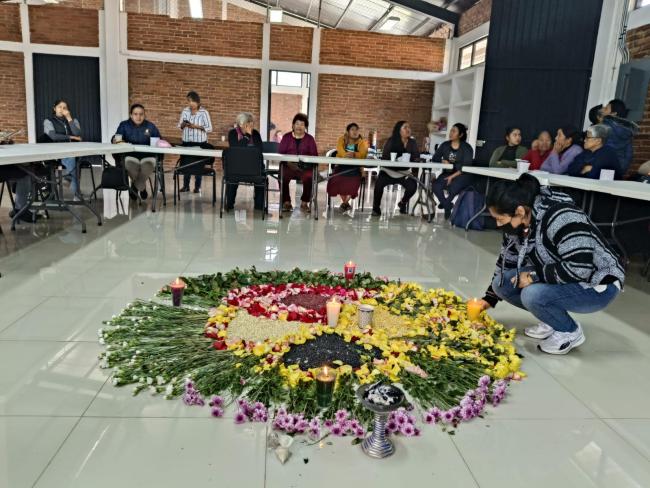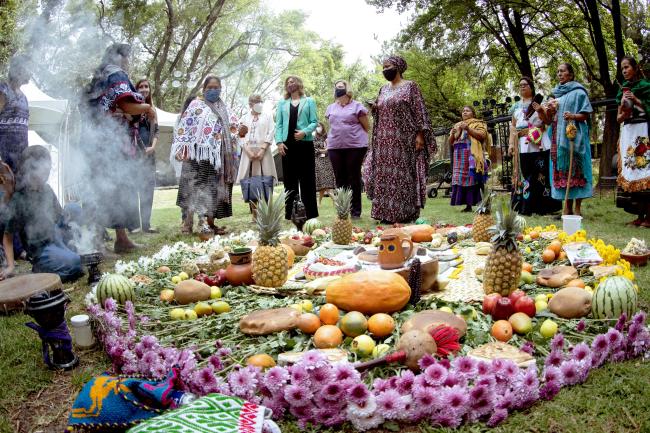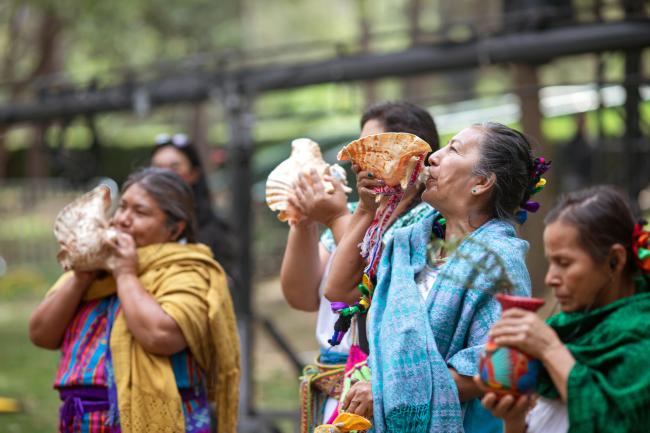
Leer este artículo en español.
Sebastiana Vásquez, a midwife and language interpreter in Chiapas, Mexico, received a midnight call a few years ago to come to the hospital. The doctors needed her to translate to an Indigenous woman that she was expected to have a stillbirth and required a cesarean section. When Vásquez arrived, she asked to examine the patient for herself. “Suddenly, I hear one baby’s heartbeat on one side and another heartbeat lower down,” recalls Vásquez. “I saw the baby's head fully crowned and said, ‘Why go for a c-section?’” After the first baby was born, the resident doctor argued that the second baby could not be delivered. But Vásquez insisted, urging the resident to help her reposition the twin. “Both babies came out alive,” she says, explaining that not only was surgical intervention not necessary, but there was little reason to expect a stillbirth. “That's why now I tell the doctors: ‘You can't tell me something I don't know. You studied in school, but my hands have worked for many years.’”
As an interpreter and traditional midwife, Vásquez occupies a position at the intersection of Western and Indigenous medicine. Her story shows how traditional midwives’ skills can be critical assets for the maternal and neonatal health challenges that Mexican women and the country’s healthcare system face today.
Just before the first woman president of Mexico takes office—Claudia Sheinbaum was elected in June with 60 percent of the vote—the country’s Congress passed a reform in March of this year recognizing around 15,400 practicing traditional midwives as healthcare providers. Traditional midwives, or parteras tradicionales, draw on ancestral knowledge of herbal remedies, massage, ointments, and healing to deliver babies in homes. The reform authorizes midwives to issue birth certificates for the almost 90,000 births they attend to every year, particularly significant in Indigenous areas where traditional midwives deliver eight out of every 10 newborns.
Access to birth certificates protects these newborns’ right to identity, from which all other services and constitutional rights follow. The reform also protects a woman’s freedom to decide how and where to give birth, including her right to access traditional medicine. Marking a critical victory for the movement of traditional midwives, the reform acknowledges that parteras obtain authority from their communities, rather than the government, a departure from long-established efforts to place midwifery under the control of the health sector. While the number of midwives has been in decline in recent decades, they have organized to demand recognition for their labor and the right to be able to work in collaboration with other public health professionals.
Filling Gaps in a Fractured Healthcare System
The recent achievement comes at a time when rates of cesarean sections are rising globally, and are particularly high in Latin America and the Caribbean. Reaching 54 percent in 2023, Mexico has one of the highest rates in the world—well above the World Health Organization’s recommended rate of 10 to 15 percent. Overcrowded Mexican hospitals have led medical personnel to resort to cesarean sections to expedite births. As many as 24 percent of the c-sections carried out in 2023 were reportedly not authorized by the women on whom they were performed. Public health experts and advocates of Indigenous and traditional midwifery call the high rates of cesarean sections evidence of unnecessary and invasive surgery, and note that obstetric violence occurs far more often in hospital settings compared to home settings.
President Andrés Manuel López Obrador’s attempt to consolidate Mexico’s fragmented healthcare system has effectively left large swaths of the population without access to care and created gaps in funding for reproductive health. In 2020, Lopez Obrador replaced Seguro Popular, covering millions of people without social security, with a new purportedly universal healthcare system, but the rollout of the program failed due to unclear guidelines, bureaucratic inefficiencies, and the emergence of Covid-19. The transition left the most vulnerable populations—including 38.7 percent of women in 2022—without access to healthcare services, roughly the same percentage of women living in poverty that year. In May 2023, the administration abandoned its initial plan and leveraged the established infrastructure of the Mexican Institute of Social Security (IMSS) to create IMSS Bienestar, with a focus on underserved and rural areas. The transition has been fraught with problems and is still taking effect. As a result of the disinvestment and administrative delays, hospitals reported shortages in staffing, medical supplies, and Indigenous language interpreters for births over the six-year presidential term.
Meanwhile, the ancient practice of home midwifery provides numerous health benefits for women and newborns. Studies show correlations between traditional midwifery and reductions in unnecessary interventions during childbirth, cesarean sections, preterm births, postpartum depression, anemia, and increased rates of breastfeeding. Midwifery or partería fills gaps in uneven maternal health coverage in addition to facilitating the transmission of Indigenous heritage.
Given the shortfalls for maternal health within the formal health sector, will the reform acknowledging traditional midwives truly herald increased recognition of healthcare providers outside of clinical settings? President-elect Sheinbaum has pledged to protect Indigenous rights, yet it remains to be seen if her health agenda will consider the benefits of traditional midwifery. For activists, legal recognition opens pathways to redress systemic discrimination and promote sustained investment in the ancestral practice.

The Fight Against Ethnocide of Indigenous Heritage
A vibrant network of parteras across Mexico are mobilizing to promote and defend traditional midwifery. The Movement of Parteras of Chiapas Nich Ixm (nich ixim means corn flower), born in 2017, has grown to include more than 600 midwives from more than 30 Indigenous and mestizo municipalities. Nich Ixim began to align with movements across the country to create a national advocacy agenda. Ofelia Pérez Ruiz, a third-generation midwife and spokesperson for the Movement, describes the violence, discrimination, and racism that compelled the midwives to unite. “When there is a transfer [to a hospital setting] due to complications with the woman or the newborn, we often face rejection from doctors to [be allowed to] attend to them in the hospitals,” she says. Having a platform to share their experiences as Indigenous women subject to discrimination for practicing their craft has fostered a sense of unity within the movement.
Parteras reportedly experience regular threats from hospital staff for practicing outside of the formal health sector. “If there is a complication, they’re afraid they’ll go to jail or have a fine, that there will be a big investigation,” explains Pérez Ruiz. A survey of 67 midwives from 22 states found that eight out of 10 described their work as dangerous. Perceived danger not only causes some parteras to stop attending births, but also dissuades younger generations from entering the practice. This leads to critical gaps in reproductive healthcare for women and communities who are either distrustful of Western medicine or don’t have reliable access to medical facilities.
In addition to state repression, parteras endure adverse labor conditions. A study of 257 Mexican parteras found that many midwives stopped attending births due to health conditions ranging from hypertension to loss of vision. Lacking access to their own care, others died from complications with diabetes and Covid-19. Their dubious legal status has meant that parteras work without official salaries. Estimates from the World Health Organization suggest that community-based health workers in maternal health roles perform $17 trillion worth of unpaid healthcare services a year.
Vásquez explains that a family will often compensate midwives with beans, corn, or anywhere from $10 to $30 for attending a birth. “The government should support midwives because they dedicate their lives to the community,” she explains. “Payment is important because many families live in poverty. I’ve helped single mothers, for example, who have no beds and live on the floor. What are you going to charge such a family?”
Advocates maintain that the significant contributions to public health made by traditional midwives merit state compensation and support. Without it, the practice struggles to survive.
Discrimination from the health sector and the lack of labor rights, healthcare, and adequate compensation all threaten the future of traditional midwifery. Anthropologist Fanny Escobar Melo from the Autonomous University of Mexico City calls the marginalization of partería a form of “ethnocide” of Indigenous heritage.

Challenges Ahead for the Movement
While midwives have won recognition as separate from the health system under the new General Health Law, parteras still resist state regulation from the Secretary of Health. In 2022, before the reform passed through Congress, the Secretary of Health announced a draft proposal to regulate midwifery, and the national movement of midwives organized in opposition. Pérez Ruiz explains: “The [state] needs to find a way to separate, but also to link traditional medicine with the Western health system so that there is mutual communication when there is a complication with the women or the newborn.” She continues, “Those are the types of relationships we seek, not to be included in the same system.” So far no regulatory standard has been issued by the Secretary of Health, yet the proposal shows that the terms of separate legal recognition remain an ongoing struggle.
Beyond autonomous legal recognition, the movement also seeks to redress the pervasive discrimination parteras face on the ground. The authors of a report on the current state of Indigenous midwifery in Mexico calls for “urgent dialogue with the federal authorities of IMSS-Bienestar to reverse the campaign to discredit, delegitimize, and prohibit the practice of traditional and Indigenous midwifery.” The report also points to the need for a cultural transformation within hospitals through an initiative to “sensitize directors and hospital staff… in order to achieve a respectful and collaborative relationship with midwives.” Effective maternal health policy underscores the importance of traditional midwives’ ability to refer patients and share knowledge with health institutions. Midwifery advocates call for “interculturality” trainings that do not take a hegemonic approach to biomedicine, but invite bilateral knowledge sharing.
Parteras are largely willing to build collaborative relationships with the healthcare sector. “To prevent maternal and neonatal mortality, this is our collective vision,” says Pérez Ruiz. “That’s why we believe that this change is very important and that it can be achieved, as long as the health institutions are willing to listen to us.” Her vision requires a paradigm shift from subordination to dignified respect of parteras’ expertise at every level of the health sector.
Investing in the Future of Partería
Ensuring the safe and dignified practice of partería will mean investing in parteras themselves. The Agenda for the Defense and Promotion of Partería Tradicional calls for “an unconditional economic stimulus for traditional midwives for the healthcare that we… provide to communities, even covering tasks that would correspond to health institutions.” Existing examples of state compensation have generally been conditional on co-attending with a clinical professional or referrals from the formal health sector. The movement urges Mexico to step out as a global leader to provide compensation for traditional midwives without state regulation.
Will Sheinbaum’s administration break from the past to protect the future of traditional and community midwifery? Regardless of government action, midwives are determined to see their practice live on. “We’re going to start mentoring the next cohort of parteras,” says Vásquez. Through her organization Sakil Nichim Antsetik (women of the white flowers), she imparts the wisdom of her hands to the next generation. As the movement grows, their advocacy gives birth to new possibilities for maternal health justice.
Becki Marcus is dedicated to people-powered movements for climate justice and health equity. Based in Mexico City, she produces a global web series on direct democracy and writes as a freelance journalist.

